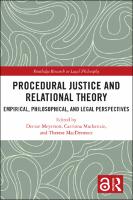Procedural Justice and Relational Theory
Proposal review
Empirical, Philosophical, and Legal Perspectives
Contributor(s)
Meyerson, Denise (editor)
Mackenzie, Catriona (editor)
MacDermott, Therese (editor)
Language
EnglishAbstract
This book bridges a scholarly divide between empirical and normative theorizing about procedural justice in the context of relations of power between citizens and the state. Empirical research establishes that people’s understanding of procedural justice is shaped by relational factors. A central premise of this volume is that this research is significant but needs to be complemented by normative theorizing that draws on relational theories of ethics and justice to explain the moral significance of procedures and make normative sense of people’s concerns about relational factors. The chapters in Part 1 provide comprehensive reviews of empirical studies of procedural justice in policing, courts and prisons. Part 2 explores empirical and normative perspectives on procedural justice and legitimacy. Part 3 examines philosophical approaches to procedural justice. Part 4 considers the implications of a relational perspective for the design of procedures in a range of legal contexts. This collection will be of interest to a wide academic readership in philosophy, law, psychology and criminology.
Keywords
Jurisprudence and general issues; Legal systems: civil procedure, litigation and dispute resolution; Criminal procedure; Public health and safety law; Ethics and moral philosophy; Social and political philosophy; Psychology; Social, group or collective psychologyDOI
10.4324/9780429317248ISBN
9781000207668, 9780429317248, 9780367565176, 9780367321727, 9781000207668Publisher
Taylor & FrancisPublisher website
https://taylorandfrancis.com/Publication date and place
2021Imprint
RoutledgeSeries
Routledge Research in Legal Philosophy,Classification
Jurisprudence and general issues
Legal systems: civil procedure, litigation and dispute resolution
Criminal procedure
Public health and safety law
Ethics and moral philosophy
Social and political philosophy
Psychology
Social, group or collective psychology


 Download
Download